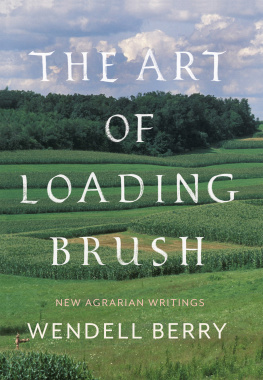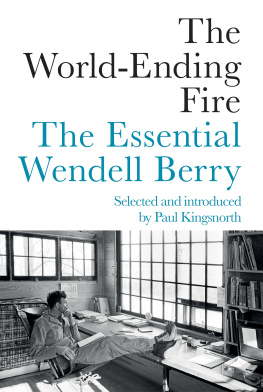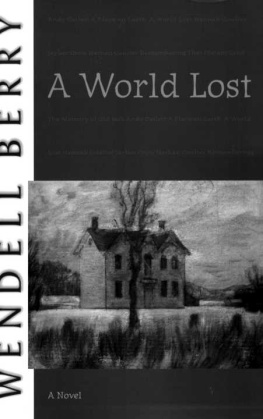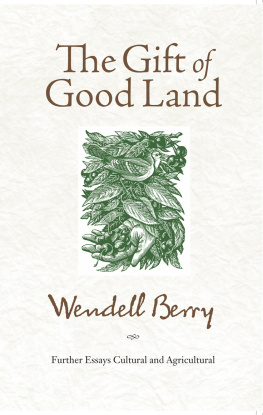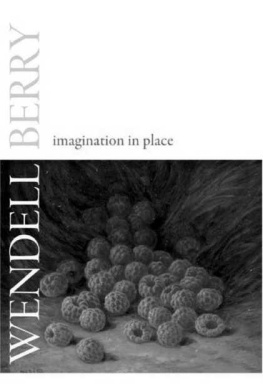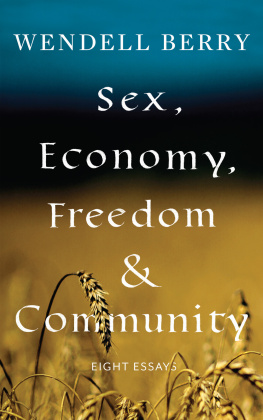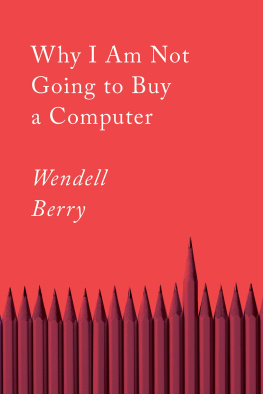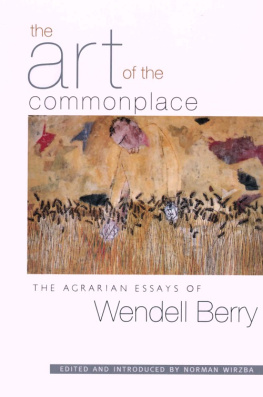Wendell Berry - The art of loading brush : new agrarian writings
Here you can read online Wendell Berry - The art of loading brush : new agrarian writings full text of the book (entire story) in english for free. Download pdf and epub, get meaning, cover and reviews about this ebook. year: 2019, genre: Politics. Description of the work, (preface) as well as reviews are available. Best literature library LitArk.com created for fans of good reading and offers a wide selection of genres:
Romance novel
Science fiction
Adventure
Detective
Science
History
Home and family
Prose
Art
Politics
Computer
Non-fiction
Religion
Business
Children
Humor
Choose a favorite category and find really read worthwhile books. Enjoy immersion in the world of imagination, feel the emotions of the characters or learn something new for yourself, make an fascinating discovery.
- Book:The art of loading brush : new agrarian writings
- Author:
- Genre:
- Year:2019
- Rating:5 / 5
- Favourites:Add to favourites
- Your mark:
- 100
- 1
- 2
- 3
- 4
- 5
The art of loading brush : new agrarian writings: summary, description and annotation
We offer to read an annotation, description, summary or preface (depends on what the author of the book "The art of loading brush : new agrarian writings" wrote himself). If you haven't found the necessary information about the book — write in the comments, we will try to find it.
The art of loading brush : new agrarian writings — read online for free the complete book (whole text) full work
Below is the text of the book, divided by pages. System saving the place of the last page read, allows you to conveniently read the book "The art of loading brush : new agrarian writings" online for free, without having to search again every time where you left off. Put a bookmark, and you can go to the page where you finished reading at any time.
Font size:
Interval:
Bookmark:


also by wendell berry
Another Turn of the Crank
The Art of the Commonplace
Citizenship Papers
A Continuous Harmony
The Gift of Good Land
Harlan Hubbard: Life and Work
The Hidden Wound
Home Economics
Life Is a Miracle
The Long-Legged House
The Poetry of William Carlos Williams of Rutherford
Recollected Essays: 19651980
Sex, Economy, Freedom and Community
Standing by Words
The Unforeseen Wilderness
The Unsettling of America
The Way of Ignorance
What Are People For?
Tamed by a Bear
Coming Home to Nature-Spirit-Self
Copyright 2017 by Priscilla Stuckey
First Counterpoint hardcover edition: July 2017
All rights reserved under International and Pan-American Copyright Conventions. No part of this book may be used or reproduced in any manner whatsoever without written permission from the publisher, except in the case of brief quotations embodied in critical articles and reviews.
ISBN: 978-1-61902-955-2
The Library of Congress Cataloging-in-Publication Data is available.
Jacket designed by Debbie Berne
Book designed by Domini Dragoone
COUNTERPOINT
2560 Ninth Street, Suite 318
Berkeley, CA 94710
www.counterpointpress.com
Printed in the United States of America
Distributed by Publishers Group West
10 9 8 7 6 5 4 3 2 1
The Art of Loading Brush
Copyright 2017 by Wendell Berry
All rights reserved under International and Pan-American Copyright Conventions. No part of this book may be used or reproduced in any manner whatsoever without written permission from the publisher, except in the case of brief quotations embodied in critical articles and reviews.
This book contains works of fiction. Names, characters, places, and incidents are the product of the authors imagination or are used imaginatively.
ISBN: 978-1-61902-038-2
The Library of Congress Cataloging-in-Publication Data is available.
Jacket designed by Nicole Caputo
Book designed by Tabitha Lahr
COUNTERPOINT
2560 Ninth Street, Suite 318
Berkeley, CA 94710
www.counterpointpress.com
Printed in the United States of America
Distributed by Publishers Group West
10 9 8 7 6 5 4 3 2 1
This book is indebted, as most of my books have been, to my conversation with my brother, John Marshall Berry, Jr. That conversation began in earnest half a century ago and ended just a few days before he died on October 27, 2016.
Our conversation remained from beginning to end under the influence of our father, of his devotion to farming, of his work in behalf of the small farmers of our region, and of our conversation with him.
That conversation was taken up many years ago between Tanya Berry and me. It continues between us and our children and their children.
This is the conversation of agrarians and agrarianism, far larger, older, and longer than our family or any family can remember, involving some people we know, and many we dont know.
I dedicate this book to that conversation and to all of its members, once, now, and to come.
You had to be here then to be able to dont see it and dont hear it now. But I was here then, and I dont see it now...
Ernest J. Gaines, A Gathering of Old Men
... our assumption that everything is provisional and soon to be superseded, that the attainment of goods we have never yet had, rather than the defence and conservation of those we have already, is the cardinal business of life...
C. S. Lewis, De Descriptione Temporum, Selected Literary Essays
My view is that all artists, whether they know it or not, whether they would repudiate the notion or not, are in fact showers forth of things which tend to be impoverished, or misconceived, or altogether lost or willfully set aside in the preoccupations of our present intense technological phase, but which, none the less, belong to man.
So that when asked to what end does my work proceed I can do no more than answer... thus: Perhaps it is in the maintenance of some sort of single plank in some sort of bridge.
David Jones, The Dying Gaul
We are responsible for what we remember.
John Lukacs, talking with students at the University of Louisville, March 9, 2011
Contents
Preface by Maurice Telleen
Introduction
The Thought of Limits in a Prodigal Age
Leaving the Future Behind: A Letter to a Scientific Friend
The Presence of Nature in the Natural World: A Long Conversation
The Order of Loving Care
A Long Ancestry
The Branch Way of Doing
The Art of Loading Brush
Epilogue: What Passes, What Remains (from Sabbaths 2016 VIII)

Preface
by Maurice Telleen (in absentia)
Whatever agrarianism is, it is too important to be a mere movement.
Movements, almost by definition, are compelled to be certain or right. So it is not surprising that they tend to be self-righteous. In addition to being right they are convinced of both their inevitability and their superiority. The latter confers an aura of both practicality and pragmatism on them. Movements leave little room for meaningful dissent. They regard themselves as destiny. Movements are big on tunnel vision. Their tunnel. Their vision. So, let us agrarians give thanks that we are not part of a certified and accredited movement.
Agrarianisms natural home is the field, the garden, the stable, the prairie, the forest, the tribe, or the village... and the cottage rather than the castle. So it is little wonder that most contemporary Americans are strangers to the term, the concept, and the geography.
One reason, I believe, for its being ignored is that agrarianism isnt just about money. It might get a more respectful hearing if it were. But it is about culture, just as agriculture was about culture. Before it got run into the ditch by agribusiness.
A funny thing about cultures is that they produce people who understand more than they know. Sort of like osmosis. So the old agrarians, to get back to our subject, knew a lot about local soil, local weather, local crops, animal behavior, and each other. They depended on each other. It almost defines that much abused word, provincial. It was very provincial and no doubt carried a load of both inertia and foolishness, along with wisdom.
But whatever the mix, it was rooted in places, communities, continuity, and people whose names and faces you knew. As a matrix, it worked reasonably well. Which is different from claiming that it was idyllic and completely satisfactory.
Introduction
I
This book, like several others I have written, is intended as a part of a public conversation about the relationship of our lives, and of our communal and economic life, to the lands we live from. That no such public conversation exists presently, or has existed for the last sixty or seventy years, has never been, and is not now, an obstacle to my contribution.
Tanya Berry, my wife, says that my principal asset as a writer has been my knack for repeating myself. That insight has instructed and amused me very much, because she is right and so forthrightly right. It is true that my writings have often repeated certain movements of thought, which, as I must hope, have been made clearer by being repeated in changes of perception and context.
Next pageFont size:
Interval:
Bookmark:
Similar books «The art of loading brush : new agrarian writings»
Look at similar books to The art of loading brush : new agrarian writings. We have selected literature similar in name and meaning in the hope of providing readers with more options to find new, interesting, not yet read works.
Discussion, reviews of the book The art of loading brush : new agrarian writings and just readers' own opinions. Leave your comments, write what you think about the work, its meaning or the main characters. Specify what exactly you liked and what you didn't like, and why you think so.

